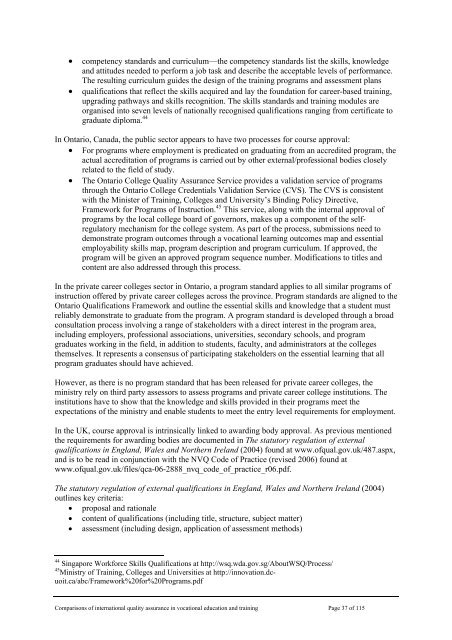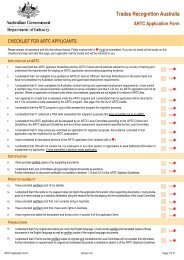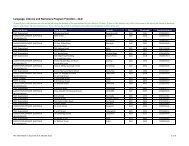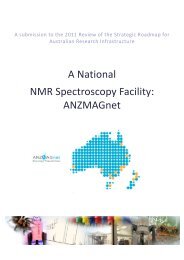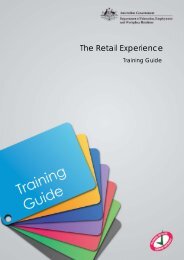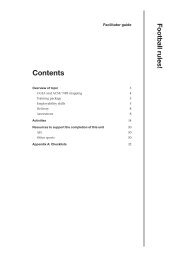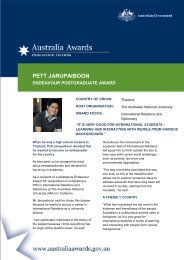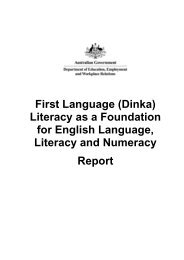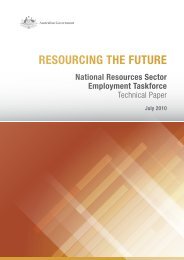Review - Department of Innovation, Industry, Science and Research
Review - Department of Innovation, Industry, Science and Research
Review - Department of Innovation, Industry, Science and Research
Create successful ePaper yourself
Turn your PDF publications into a flip-book with our unique Google optimized e-Paper software.
• competency st<strong>and</strong>ards <strong>and</strong> curriculum—the competency st<strong>and</strong>ards list the skills, knowledge<br />
<strong>and</strong> attitudes needed to perform a job task <strong>and</strong> describe the acceptable levels <strong>of</strong> performance.<br />
The resulting curriculum guides the design <strong>of</strong> the training programs <strong>and</strong> assessment plans<br />
• qualifications that reflect the skills acquired <strong>and</strong> lay the foundation for career-based training,<br />
upgrading pathways <strong>and</strong> skills recognition. The skills st<strong>and</strong>ards <strong>and</strong> training modules are<br />
organised into seven levels <strong>of</strong> nationally recognised qualifications ranging from certificate to<br />
graduate diploma. 44<br />
In Ontario, Canada, the public sector appears to have two processes for course approval:<br />
• For programs where employment is predicated on graduating from an accredited program, the<br />
actual accreditation <strong>of</strong> programs is carried out by other external/pr<strong>of</strong>essional bodies closely<br />
related to the field <strong>of</strong> study.<br />
• The Ontario College Quality Assurance Service provides a validation service <strong>of</strong> programs<br />
through the Ontario College Credentials Validation Service (CVS). The CVS is consistent<br />
with the Minister <strong>of</strong> Training, Colleges <strong>and</strong> University’s Binding Policy Directive,<br />
Framework for Programs <strong>of</strong> Instruction. 45 This service, along with the internal approval <strong>of</strong><br />
programs by the local college board <strong>of</strong> governors, makes up a component <strong>of</strong> the selfregulatory<br />
mechanism for the college system. As part <strong>of</strong> the process, submissions need to<br />
demonstrate program outcomes through a vocational learning outcomes map <strong>and</strong> essential<br />
employability skills map, program description <strong>and</strong> program curriculum. If approved, the<br />
program will be given an approved program sequence number. Modifications to titles <strong>and</strong><br />
content are also addressed through this process.<br />
In the private career colleges sector in Ontario, a program st<strong>and</strong>ard applies to all similar programs <strong>of</strong><br />
instruction <strong>of</strong>fered by private career colleges across the province. Program st<strong>and</strong>ards are aligned to the<br />
Ontario Qualifications Framework <strong>and</strong> outline the essential skills <strong>and</strong> knowledge that a student must<br />
reliably demonstrate to graduate from the program. A program st<strong>and</strong>ard is developed through a broad<br />
consultation process involving a range <strong>of</strong> stakeholders with a direct interest in the program area,<br />
including employers, pr<strong>of</strong>essional associations, universities, secondary schools, <strong>and</strong> program<br />
graduates working in the field, in addition to students, faculty, <strong>and</strong> administrators at the colleges<br />
themselves. It represents a consensus <strong>of</strong> participating stakeholders on the essential learning that all<br />
program graduates should have achieved.<br />
However, as there is no program st<strong>and</strong>ard that has been released for private career colleges, the<br />
ministry rely on third party assessors to assess programs <strong>and</strong> private career college institutions. The<br />
institutions have to show that the knowledge <strong>and</strong> skills provided in their programs meet the<br />
expectations <strong>of</strong> the ministry <strong>and</strong> enable students to meet the entry level requirements for employment.<br />
In the UK, course approval is intrinsically linked to awarding body approval. As previous mentioned<br />
the requirements for awarding bodies are documented in The statutory regulation <strong>of</strong> external<br />
qualifications in Engl<strong>and</strong>, Wales <strong>and</strong> Northern Irel<strong>and</strong> (2004) found at www.<strong>of</strong>qual.gov.uk/487.aspx,<br />
<strong>and</strong> is to be read in conjunction with the NVQ Code <strong>of</strong> Practice (revised 2006) found at<br />
www.<strong>of</strong>qual.gov.uk/files/qca-06-2888_nvq_code_<strong>of</strong>_practice_r06.pdf.<br />
The statutory regulation <strong>of</strong> external qualifications in Engl<strong>and</strong>, Wales <strong>and</strong> Northern Irel<strong>and</strong> (2004)<br />
outlines key criteria:<br />
• proposal <strong>and</strong> rationale<br />
• content <strong>of</strong> qualifications (including title, structure, subject matter)<br />
• assessment (including design, application <strong>of</strong> assessment methods)<br />
44 Singapore Workforce Skills Qualifications at http://wsq.wda.gov.sg/AboutWSQ/Process/<br />
45 Ministry <strong>of</strong> Training, Colleges <strong>and</strong> Universities at http://innovation.dcuoit.ca/abc/Framework%20for%20Programs.pdf<br />
Comparisons <strong>of</strong> international quality assurance in vocational education <strong>and</strong> training Page 37 <strong>of</strong> 115


